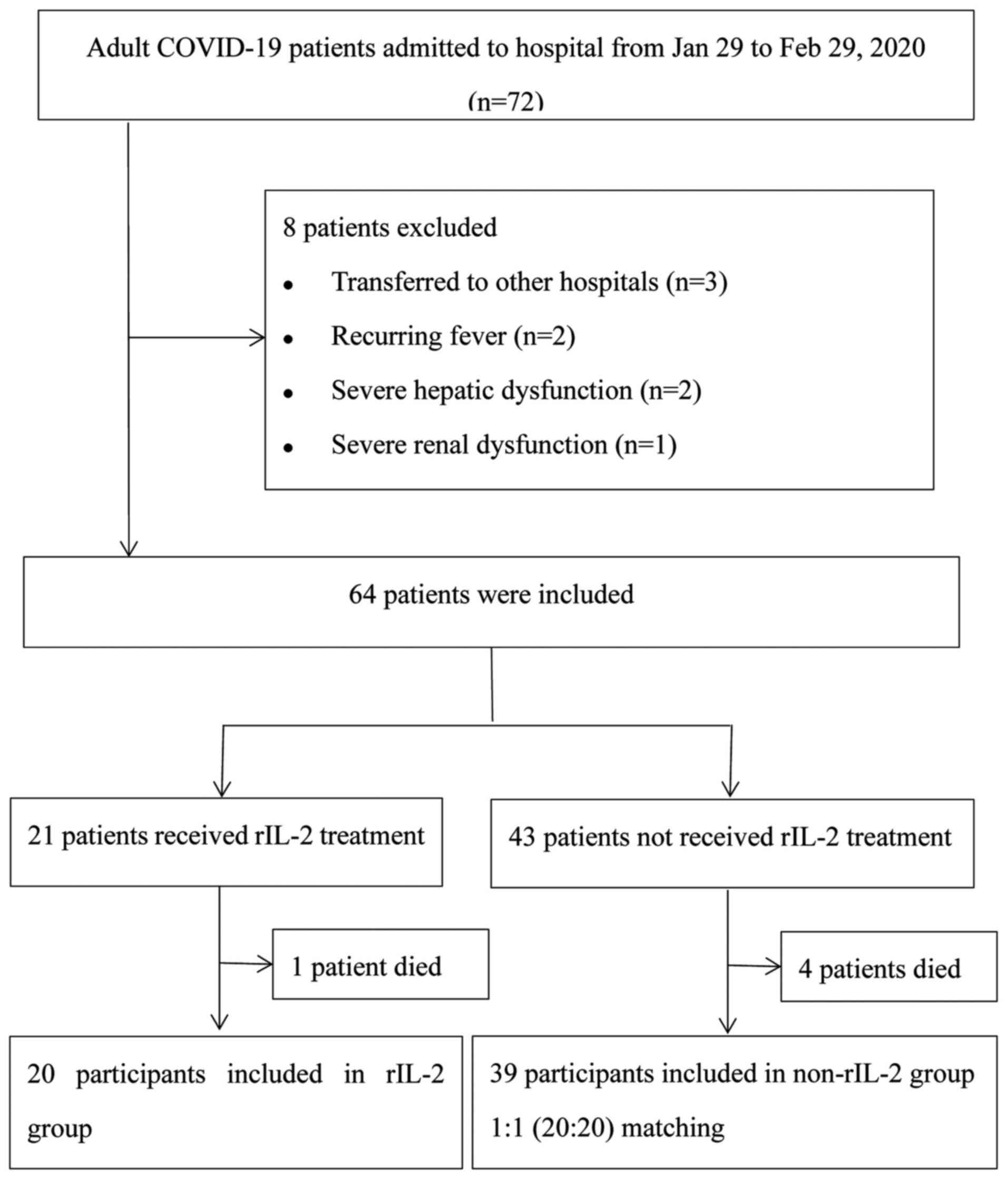|
1
|
WHO: Coronavirus disease 2019 (COVID-19)
Situation report-Weekly epidemiological update - 29 December 2020.
Available from: https://www.who.int/publications/m/item/weekly-epidemiological-update---29-december-2020.
|
|
2
|
Ravalli S and Musumeci G: Coronavirus
Outbreak in Italy: Physiological benefits of home-based exercise
during pandemic. J Funct Morphol Kinesiol. 5(31)2020.PubMed/NCBI View Article : Google Scholar
|
|
3
|
Dimitriou F, Matter AV, Mangana J,
Urosevic-Maiwald M, Micaletto S, Braun RP, French LE and Dummer R:
Cytokine release syndrome during sequential treatment with immune
checkpoint inhibitors and kinase inhibitors for metastatic
melanoma. J Immunother. 42:29–32. 2019.PubMed/NCBI View Article : Google Scholar
|
|
4
|
Huang C, Wang Y, Li X, Ren L, Zhao J, Hu
Y, Zhang L, Fan G, Xu J, Gu X, et al: Clinical features of patients
infected with 2019 novel coronavirus in Wuhan, China. Lancet.
395:497–506. 2020.PubMed/NCBI View Article : Google Scholar
|
|
5
|
Nunnari G, Sanfilippo C, Castrogiovanni P,
Imbesi R, Li Volti G, Barbagallo I, Musumeci G and Di Rosa M:
Network perturbation analysis in human bronchial epithelial cells
following SARS-CoV2 infection. Exp Cell Res.
395(112204)2020.PubMed/NCBI View Article : Google Scholar
|
|
6
|
Liu J, Li S, Liu J, Liang B, Wang X, Wang
H, Li W, Tong Q, Yi J, Zhao L, et al: Longitudinal characteristics
of lymphocyte responses and cytokine profiles in the peripheral
blood of SARS-CoV-2 infected patients. EBioMedicine.
55(102763)2020.PubMed/NCBI View Article : Google Scholar
|
|
7
|
Wen W, Su W, Tang H, Le W, Zhang X, Zheng
Y, Liu X, Xie L, Li J, Ye J, et al: Immune cell profiling of
COVID-19 patients in the recovery stage by single-cell sequencing.
Cell Discov. 6(31)2020.PubMed/NCBI View Article : Google Scholar
|
|
8
|
Wang D, Hu B, Hu C, Fangfang Zhu F, Liu X,
Zhang J, Wang B, Xiang H, Cheng Z, Xiong Y, et al: Clinical
characteristics of 138 hospitalized patients with 2019 Novel
Coronavirus-infected pneumonia in Wuhan. JAMA. 323:1061–1069.
2020.PubMed/NCBI View Article : Google Scholar
|
|
9
|
Ni L, Chen L, Huang X, Han C, Xu J, Zhang
H, Luan X, Zhao Y, Xu J, Yuan W, et al: Combating COVID-19 with
integrated traditional Chinese and Western medicine in China. Acta
Pharm Sin B. 10:1149–1162. 2020.PubMed/NCBI View Article : Google Scholar
|
|
10
|
Nagayama H, Takahashi S, Takahashi T,
Ogami K, Ikebuchi K, Tojo A, Tani K and Asano S: IL-2LAK therapy
for refractory acute monoblastic leukemia relapsing after unrelated
allogeneic bone marrow transplantation. Bone Marrow Transplant.
23:183–185. 1999.PubMed/NCBI View Article : Google Scholar
|
|
11
|
Chen N, Zhou M, Dong X, Qu J, Gong F, Han
Y, Qiu Y, Wang J, Liu Y, Wei Y, et al: Epidemiological and clinical
characteristics of 99 cases of 2019 novel coronavirus pneumonia in
Wuhan, China: A descriptive study. Lancet. 395:507–513.
2020.PubMed/NCBI View Article : Google Scholar
|
|
12
|
Chen G, Wu D, Guo W, Cao Y, Huang D, Wang
H, Wang T, Zhang X, Chen H, Yu H, et al: Clinical and immunological
features of severe and moderate coronavirus disease 2019. J Clin
Invest. 130:2620–2629. 2020.PubMed/NCBI View Article : Google Scholar
|
|
13
|
Pett SL, Kelleher AD and Emery S: Role of
interleukin-2 in patients with HIV infection. Drugs. 70:1115–1130.
2010.PubMed/NCBI View Article : Google Scholar
|
|
14
|
Shi H, Wang W, Yin J, Ouyang Y, Pang L,
Feng Y, Qiao L, Guo X, Shi H, Jin R, et al: The inhibition of
IL-2/IL-2R gives rise to CD8+ T cell and lymphocyte
decrease through JAK1-STAT5 in critical patients with COVID-19
pneumonia. Cell Death Dis. 11(429)2020.PubMed/NCBI View Article : Google Scholar
|
|
15
|
Mahmoudpour SH, Jankowski M, Valerio L,
Becker C, Espinola-Klein C, Konstantinides S, Quitzau K and Barco
S: Safety of low-dose subcutaneous recombinant interleukin-2:
Systematic review and meta-analysis of randomized controlled
trials. Sci Rep. 9(7145)2019.PubMed/NCBI View Article : Google Scholar
|
|
16
|
Reddehase MJ, Mutter W and Koszinowski UH:
In vivo application of recombinant interleukin 2 in the
immunotherapy of established cytomegalovirus infection. J Exp Med.
165:650–656. 1987.PubMed/NCBI View Article : Google Scholar
|
|
17
|
Crespo M, Caragol I, Falcó V, Ribera E,
Urban S and Pahissa A: Efficacy of recombinant interleukin-2
(rIL-2) in patients with advanced HIV-1 infection and blunted
immune response to HAART. Enferm Infecc Microbiol Clin. 26:27–31.
2008.PubMed/NCBI View
Article : Google Scholar
|
|
18
|
He J, Zhang X, Wei Y, Sun X, Chen Y, Deng
J, Jin Y, Gan Y, Hu X, Jia R, et al: Low-dose interleukin-2
treatment selectively modulates CD4(+) T cell subsets in patients
with systemic lupus erythematosus. Nat Med. 22:991–993.
2016.PubMed/NCBI View
Article : Google Scholar
|
|
19
|
Zhou L, Opalinska J, Sohal D, Yu Y, Mo Y,
Bhagat T, Abdel-Wahab O, Fazzari M, Figueroa M, Alencar C, et al:
Aberrant epigenetic and genetic marks are seen in myelodysplastic
leukocytes and reveal Dock4 as a candidate pathogenic gene on
chromosome 7q. J Biol Chem. 286:25211–25223. 2011.PubMed/NCBI View Article : Google Scholar
|
|
20
|
Schub D, Klemis V, Schneitler S, Mihm J,
Lepper PM, Wilkens H, Bals R, Eichler H, Gärtner BC, Becker SL, et
al: High levels of SARS-CoV-2-specific T cells with restricted
functionality in severe courses of COVID-19. JCI Insight.
5(5)2020.PubMed/NCBI View Article : Google Scholar
|
|
21
|
Sato Y, Keino H, Nakayama M, Kano M and
Okada AA: Effect of in vivo expansion of regulatory T cells with
IL-2/anti-IL-2 antibody complex plus rapamycin on experimental
autoimmune uveoretinitis. Ocul Immunol Inflamm: May 27, 2020 (Epub
ahead of print). doi: 10.1080/09273948.2020.1757119.
|
|
22
|
Overwijk WW, Tagliaferri MA and Zalevsky
J: Engineering IL-2 to give new life to T cell immunotherapy. Annu
Rev Med: Nov 6, 2020 (Epub ahead of print). doi:
10.1146/annurev-med-073118-011031.
|















